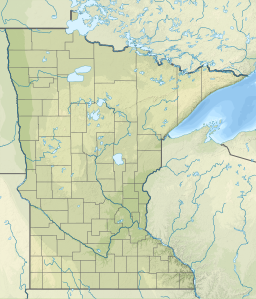| Bearskin Lake | |
|---|---|
| West Bearskin Lake, Birch Lake, Muko-waiani | |
 | |
| Location | Cook County, Minnesota |
| Group | Boundary Waters Canoe Area |
| Coordinates | 48°03′58″N 90°25′36″W / 48.066°N 90.426765°W / 48.066; -90.426765 |
| Type | oligotrophic, glacial |
| Basin countries | United States |
| Surface area | 493 acres (200 ha) |
| Average depth | 31 ft (9.4 m) |
| Max. depth | 78 ft (24 m) |
| Residence time | 17 years |
Bearskin Lake is an oligotrophic glacial lake near the Boundary Waters Canoe Area (BWCA) in Minnesota, United States. The name Bearskin Lake is an English translation of the Ojibwe-language name Muko-waiani. Bearskin Lake is a source of control sediment for US federal sediment toxicity studies. Bearskin Lake is home to Camp Menogyn, a YMCA camp only accessible by boat.
Sediments and scientific significance
Due to the cleanliness of the lake and the physical attributes of its sediment, Bearskin Lake sediment is ideal for sediment toxicity testing. Bearskin Lake sediment is used as a control sediment in the federal government's toxicity tests and was used to develop the US EPA's toxicity testing methods.
See also
Further reading
- US EPA. 2000. Methods for Measuring the Toxicity and Bioaccumulation of Sediment-associated Contaminants with Freshwater Invertebrates Second Edition.
- Kemble, N.E., C.G. Ingersoll, and J.L. Kunz. 2001. Evaluation of Toxicity of Sediment Samples Collected from Santa Ana National Wildlife Refuge, Texas. United States Geological Survey.
- Bechtel Jacobs Company LLC. 1998. Biota Sediment Accumulation Factors for Invertebrates: Review and Recommendations for the Oak Ridge Reservation U.S. Department of Energy.
- Mierzykowski, S.E., C.G. Ingersoll, and K.C. Carr. 1997 U.S. Fish and Wildlife Service New England Field Office Special Project Report: FY97-MEFO-1-EC Toxicity Tests and Sediment Chemistry at Site 9 (Neptune Drive Disposal Site).
- National Oceanic and Atmospheric Administration. 1996. Bioavailability of Sediment-Associated Toxic Organic Contaminants.
References
- Warren Upham (1920). Minnesota Geographic Names: Their Origin and Historic Significance. Minnesota Historical Society. p. 142.
- ^ EPA, OEI, OIAA, US. "Water Topics - US EPA" (PDF). US EPA.
{{cite web}}: CS1 maint: multiple names: authors list (link) - "Evaluation of toxicity of sediment samples collected from the Santa Ana National Wildlife Refuge, Texas" (PDF). www.cerc.usgs.gov. Retrieved 2024-06-20.
- "Biota Sediment Accumulation Factors for Invertebrates: Review and Recommendations for the Oak Ridge Reservation" (PDF). August 1998.
- "EC Reports". Archived from the original on 2008-10-11. Retrieved 2010-01-04.
- "Task Report". www.glerl.noaa.gov. US Department of Commerce, NOAA, Great Lakes Environmental Research Laboratory, Cooperative Institute for Limnology and Ecosystems Research.
External links
- MN DNR Lake Finder Data
- Lake Assessment Program 1995: West Bearskin Lake
- U.S. Geological Survey Geographic Names Information System: Bearskin Lake